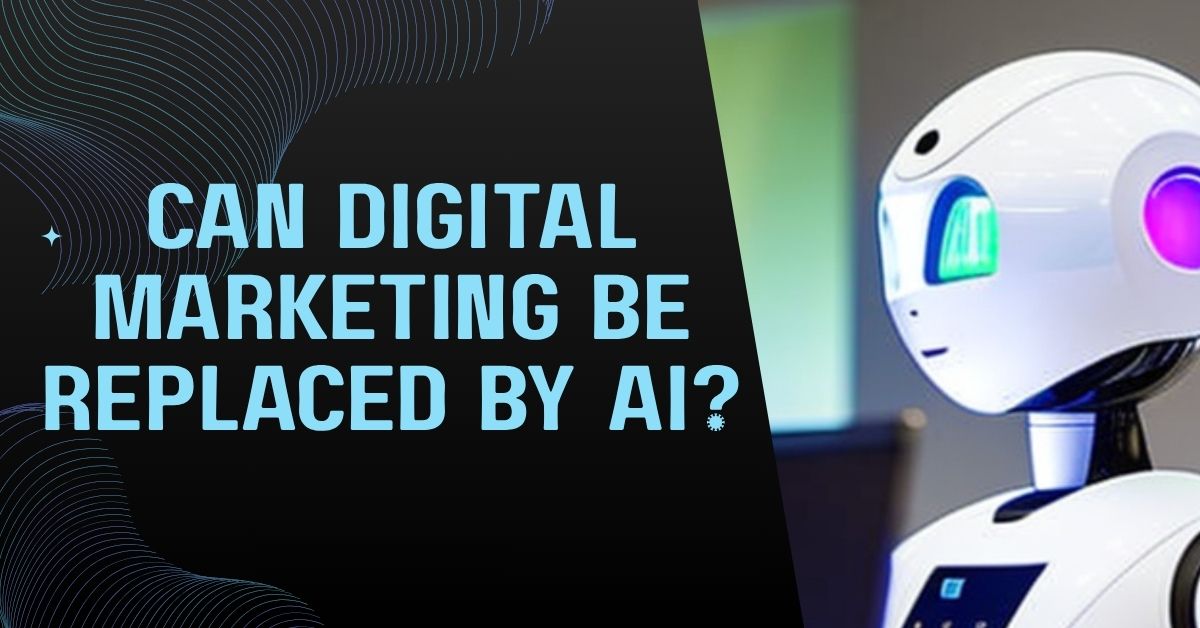Introduction
Imagine waking up to see your marketing campaign perfectly optimized, emails personalized and scheduled, SEO on point, and ads targeting just the right people—all without lifting a finger. That’s the promise AI seems to bring to digital marketing. But here’s the big question: Can AI truly replace digital marketing or just enhance it?
Let’s dig in and break it down.
The Rise of Artificial Intelligence
AI has moved from science fiction to daily application. Whether it’s Siri understanding your voice commands or Netflix suggesting your next binge, AI is everywhere.
In marketing, AI is changing the game. With its ability to process large datasets, make predictions, and learn user behavior, AI is now the cool new player on the digital marketing block.
Core Elements of Digital Marketing
Before we explore AI’s role, let’s refresh what digital marketing includes:
SEO (Search Engine Optimization)
Crafting content and strategies to rank higher on search engines.
Content Creation
Articles, videos, reels, graphics—you name it, content is king.
Social Media Management
Posting, engaging, responding—building a brand’s voice.
Paid Advertising (PPC)
Running and optimizing ads on platforms like Google and Meta.
Email Marketing
Personalized campaigns to keep customers engaged.
Analytics & Reporting
Tracking and interpreting data to guide decisions.
How AI Is Transforming Digital Marketing
Now, here’s where things get interesting.
AI in Content Creation
AI tools like ChatGPT (hey, that’s me!) can write blogs, captions, even scripts. Tools like Jasper, Copy.ai, and Writesonic are being used to generate ad copy, product descriptions, and more.
But is it always original or emotionally engaging? Not quite there yet.
AI in SEO Optimization
AI helps analyze keywords, track performance, and even suggest better structure and topics. Tools like SurferSEO and Clearscope are dominating here.
AI in Customer Support (Chatbots)
No more waiting hours for replies. Chatbots powered by NLP (Natural Language Processing) are handling customer queries 24/7.
AI in Ad Targeting and Personalization
Platforms like Facebook Ads use AI to micro-target audiences and optimize ad delivery.
AI in Data Analysis and Consumer Insights
AI can sift through tons of data and find trends marketers might miss. Think Google Analytics 4 on steroids.
Human Touch in Digital Marketing
Even the smartest AI lacks one thing: human emotion.
Emotional Intelligence and Creativity
You can’t program intuition, humor, or empathy. These are things that resonate with audiences.
Cultural Relevance and Localisation
AI may struggle with cultural nuances, slangs, or local market preferences.
Relationship Building and Trust
No bot can replicate the connection built by a genuine human interaction—especially in influencer marketing, brand building, or crisis management.
Pros of Replacing Digital Marketing with AI
Let’s be fair—AI does bring serious benefits:
Speed and Efficiency
AI doesn’t sleep. Tasks that took hours now take minutes.
Data-Driven Precision
AI processes big data in real-time, offering hyper-accurate insights.
Cost Reduction Over Time
Automating repetitive tasks means fewer hires and operational savings.
Cons of Replacing Digital Marketing with AI
Now the flipside:
Lack of Human Creativity
No matter how “intelligent,” AI can’t truly innovate or think outside the box.
Dependency on Algorithms
What happens when platforms change their algorithms? AI gets lost in translation.
Potential Biases in AI Systems
AI is only as good as the data it learns from—if it’s biased, the results will be too.
Real-Life Examples
Brands That Nailed It
Netflix: Uses AI to personalize content recommendations.
Amazon: AI predicts what you’ll want to buy next.
Spotify: Curates music using AI based on listening behavior.
When AI Goes Wrong
Microsoft’s Tay Bot: Became racist within hours of going live.
Pepsi Ad Generator: AI missed emotional and social sensitivity.
Future Trends in AI and Digital Marketing
Predictive Marketing
AI will anticipate what a customer needs before they even search.
Hyper-Personalization
Beyond “Hi [First Name]”, think real-time dynamic content tailored to user intent.
Voice and Visual Search
AI is powering search through images and voice—a whole new frontier for SEO.
Can AI Fully Replace Human Marketers?
What AI Can Replace
Data entry and reporting
A/B testing
Audience segmentation
Auto-generated content
What Needs a Human
Strategic planning
Brand storytelling
Crisis communication
Deep creativity
So, no, AI can’t replace humans—it can only empower them.
Ethical Concerns
Privacy Issues
AI often needs lots of user data. Where’s the line?
Transparency and Accountability
If AI messes up, who takes responsibility?
How Businesses Should Adapt
Integrating AI Tools with Human Oversight
Use AI to automate the mundane, but keep humans in charge of strategy.
Upskilling Marketing Teams
Teach your team how to use AI tools effectively—not fear them.
Conclusion
So, can AI replace digital marketing?
Nope. But it can supercharge it.
AI is a powerful tool that can automate, optimize, and analyze. But at its core, marketing is about human connection, storytelling, and emotions—something no machine can fully replicate. The future isn’t AI vs humans. It’s AI with humans.
FAQs
1. Will AI eliminate marketing jobs?
AI will automate repetitive tasks, but marketers who focus on creativity, strategy, and human connection will always be essential.
2. How is AI used in SEO?
AI helps with keyword research, content optimization, performance tracking, and predictive ranking analysis.
3. Can AI write effective ad copy?
Yes, but it still needs human tweaking to make it resonate emotionally and stay brand-consistent.
4. What are the risks of AI in marketing?
Privacy violations, algorithm dependency, and potential biases are major concerns.
5. What’s the future of digital marketing with AI?
It’s all about collaboration—AI doing the heavy lifting, while humans lead the creative charge.
You may also like : https://samistha.seoexpertagra.in/


